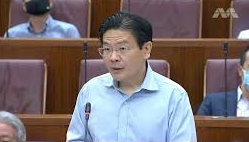PM Wong warns of slower growth, fewer jobs and smaller wage hikes; new task force formed to support firms and workers
Singapore’s Prime Minister Lawrence Wong has cautioned that the country faces significant economic headwinds as new US tariffs come into force on 9 April. While recession remains a possibility rather than a certainty, the prime minister stressed that growth will slow considerably, translating to reduced employment prospects and limited wage increases.
Addressing Parliament on Tuesday, Mr Wong acknowledged that the tariffs—announced by the Trump administration and affecting multiple countries including Singapore—pose a direct threat to key industries such as manufacturing, logistics, wholesale trade, and finance. He stated that early signs suggest the tariffs are not up for negotiation, warning: “Once protectionist measures are in place, they tend to stay.”
As Finance Minister, Mr Wong revealed that the Ministry of Trade and Industry is now reassessing the country’s 2025 GDP growth forecast, which had initially been projected at between one and three percent. Should more firms scale down operations or shift production to the US, Singapore could see a rise in retrenchments and job losses, he said.
In response, a cross-sector task force will be established to help businesses and workers cope with immediate challenges and prepare for longer-term shifts in the global economy. Led by Deputy Prime Minister Gan Kim Yong, the group will include representatives from Singapore’s economic bodies, the Singapore Business Federation, NTUC, and the National Employers Federation.
PM Wong noted that measures announced in Budget 2025—including CDC and SG60 vouchers as well as USave rebates—would offer short-term relief to households. The SkillsFuture Jobseeker Support scheme, due to launch later this month, will also assist those who become involuntarily unemployed.
Government agencies are in dialogue with firms most affected by the new trade barriers, offering tailored support and guidance. “We will keep a close eye on how things develop and are prepared to act if further intervention becomes necessary,” said Mr Wong. “We have the means to do so because of decades of prudent financial management.”
Despite these reassurances, some opposition members in Parliament challenged the government’s framing of the issue. Progress Singapore Party’s Leong Mun Wai described the warnings as exaggerated, downplaying the threat of inflation and accusing the government of “fearmongering” to secure political support. His party’s chairman, Dr Tan Cheng Bock, echoed these concerns, arguing that voters should not be manipulated through alarmist rhetoric.
By contrast, Leader of the Opposition Pritam Singh of the Workers’ Party backed the government’s call for national unity in the face of global uncertainty. He stressed the importance of representative and responsible politics, saying that a united front—regardless of race or background—remains Singapore’s strongest response to unpredictable global shifts.
Deputy PM Gan also briefed Parliament on the new task force’s objectives. Its role will include gathering insights from the private sector, understanding operational pressures on the ground, and proposing timely, effective solutions. He warned that while the immediate employment impact may be limited, structural changes in the global economy could lead to workforce adjustments over time.
“We anticipate a transformation of the economic landscape, and naturally, that includes restructuring jobs,” Gan stated. “We will remain transparent with the public—if we have crucial information, we will share it; if we don’t yet know, we will say so plainly.”
In closing, PM Wong affirmed that the dangers of rising protectionism are “very real,” but said Singapore would not retreat from global engagement. Instead, the country will remain open, adapt swiftly, and “place the interests of Singaporeans at the heart of all decisions.”



Leave a Reply